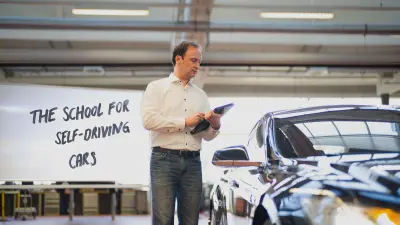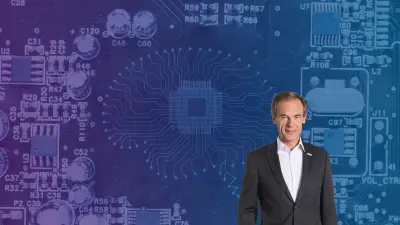“We have to not only develop AI, but build trust in AI as well”
Dr. Volkmar Denner, Bosch CEO, on the ethics of artificial intelligence
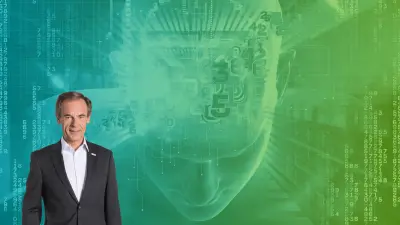
2020-02-19
It’s time to stop being hysterical about artificial intelligence. We need to focus on its benefits in everyday life.
by Dr. Volkmar Denner
Artificial intelligence needs to serve people, not the other way around. Accordingly, it must not be allowed to escape human oversight. How can human and machine intelligence complement each other? The need to provide answers to such questions has prompted Bosch to draw up a code of ethics that examines both the benefits of AI and the ethical red lines it must not cross. It sets out criteria for making decisions about the development and use of intelligent systems. In the AI age, values are especially important: responsibility engenders trust.
There is certainly a grain of truth here, but it doesn’t tell the whole story. After all, Europe has strengths that other countries do not — strengths in combining the internet of things with industrial processes, and especially in applying artificial intelligence to manufacturing. It’s high time for Europe to be more self-assertive, and to adopt an innovation policy that plays to our strengths.
“We want to make AI safe, robust, and explainable for people, whether in manufacturing or automated driving.”
AI can move beyond preconceived opinions
Public opinion is still informed by misgivings, or even by dystopian science fiction. In such dystopian visions, AI outstrips human intelligence, cannot be controlled, and costs people their jobs, if not more. The Bosch vision is a different one: we want to make AI safe, robust, and explainable for people, whether in manufacturing or automated driving. What Bosch sees in the world of work is not only technological change but also of a lack of skilled workers — and in such a context, collaboration between people and intelligent machines takes on additional significance.
This calls for companies that use customized HR and training policies to strategically shape the digital transformation — companies that invest in both the qualifications of their associates and the intelligence of their machines. Bosch too sees itself as a learning company. Over the next two years, we will be making nearly 20,000 associates fit for the development and use of AI.
AI can mitigate global warming
But the social benefits of AI go beyond everyday routine and the world of work: artificial intelligence will be a blessing for environmental protection and climate action. Even now, the Bosch energy management platform uses intelligent algorithms to detect and control individual machines’ energy consumption. Depending on the individual plant, this can reduce CO₂ by 10 percent within two years. And in the future, we will be able to use artificial intelligence to make long-term forecasts, and thus to reduce energy consumption. All this is reason enough to stop the endless debates about the risks of technology and focus on the opportunities instead.
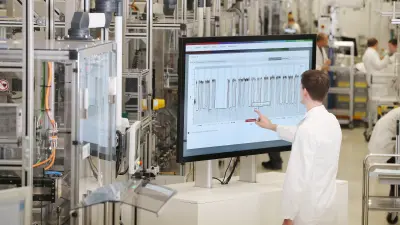
AI may be responsible for 75 million jobs being lost by 2022, but also for 133 million new jobs being created.
AI creates markets
At the same time, artificial intelligence has huge economic potential. It is not only Bosch that sees this potential, but many different studies as well. The management consultants PwC, for example, project that between now and 2030, AI will boost GDP in China by 26 percent, by 14 percent in North America, and by around 10 percent in Europe. And according to a World Economic Forum forecast, AI may be responsible for 75 million jobs being lost by 2022, but also for 133 million new jobs being created. If such forecasts are even remotely realistic, they indicate the huge economic relevance of artificial intelligence. But we will only be able to tap this potential if we can convince people of the benefits of AI — and above all build trust in digital systems.
AI needs responsibility
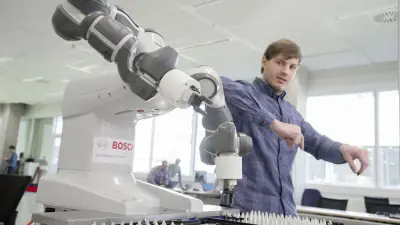
Companies such as Bosch have to take two paths in order to make a success story out of AI. Developing technological conditions and solutions, and using innovations to open up new field of business, is the one path. The other is to convince society at large of the benefits of AI. It is precisely for this reason that Bosch has drawn up a code of ethics for responsible use of artificial intelligence. We have to not only develop AI, but build trust in AI as well, and the one cannot become established without the other. For success in digital business, trust will be crucial, just as quality is for our classic product business.
AI needs human oversight
As we move toward an ethics of AI, what are the decisive issues? First and foremost, people must not completely renounce control over artificially intelligent systems. Instead, they must remain involved in these systems’ decisions. Take the example of driver assistance, where AI supports and relieves drivers of burdensome tasks. Nonetheless, drivers retain responsibility and can override the system. On no account should the algorithms of AI models be a black box. They should be developed with due care, keeping everyone in the loop. Only in this way will automated decisions be fair, and understandable for experts. When it comes to the ethics of artificial intelligence, Bosch not only gives its own engineers guidance, but is also keen to take part in a open exchange of views. What decisions can we leave to machines? When and where should people intervene? Companies need to openly discuss questions such as these with policymakers, the scientific community, and society.
AI must also be “Invented for life”
In the end, the issue at stake here is the crucial balance that has to be struck between the economic and social strands of entrepreneurial responsibility. At first glance, there appears to be a paradox: we want to develop business with AI, but are defining ethical limits to technological development. Only if we observe these red lines can trust arise, and it is our belief that, in the long run, trust is the lifeblood of our business.
It’s as simple as that. And in our new AI code of ethics, we make no bones about our red lines. For example, we will not allow one life to be pitted against another. The code of ethics doesn’t take the easy way out. Instead, it makes Bosch’s strategic imperative fit for the future, and insists that artificial intelligence also be “Invented for life.”
First published in Handelsblatt on 2020/02/19
